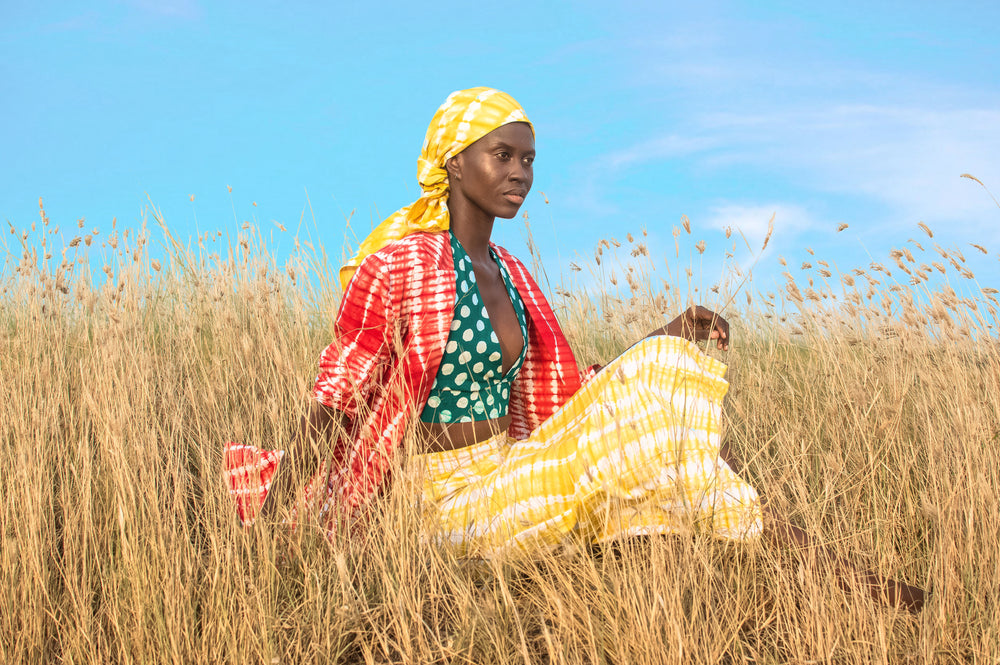How Rosario Dawson and Abrima Erwiah Are Enacting Change Through Fashion

Actress Rosario Dawson and and Abrima Erwiah, the founding director of the Gromek Institute for Fashion Business at Parsons School of Design, are motivated by people, they told Fairchild Media Group editorial director James Fallon at FMG’s Wear House event during SXSW.
The duo cofounded Studio One Eighty Nine, a direct-to-consumer, African-inspired lifestyle and fashion brand. “What keeps us motivated is the people that we work with. They want it to happen and I want it to happen. We’re moved by the power of people,” Erwiah said. “All of the times that we’ve had struggles, which has been many, given the work that we are doing, something has happened that wasn’t supposed to happen. This should not have worked out but it did. It’s incredible and magical. If you didn’t know [any better], you would think there was this army of people behind us and lots of money, but there’s not. It’s the power of people wanting change to happen.”
Dawson and Erwiah talked about fashion as an agent for change. Their business, for example, relies on artisans in Africa for production and it threads social responsibility throughout its efforts.
A winner of the CFDA Lexus Fashion Initiative for Sustainability and a CFDA/Vogue Fashion Fund Grant recipient, Studio One Eighty Nine has a manufacturing facility in Accra and it bolsters community-led projects in Africa and the U.S. by aligning with craftspeople; the label develops designs with plant-based dye indigo, hand-batik and kente weaving, as well as other specialized techniques.
Studio One Eighty Nine is committed to empowering workers and communities, creating jobs and improving education and skills training through partnerships with such organizations as the United Nations ITC Ethical Fashion Initiative. Erwiah referenced “A World of Three Zeros: The New Economics of Zero Poverty, Zero Unemployment and Zero Net Carbon Emissions,” one of the books by Muhammad Yunus, an economist and civil society leader who won the 2006 Nobel Peace Prize for founding the Grameen Bank and pioneering microcredit and microfinance to foster entrepreneurialism in communities.
During their conversation, they spoke about the challenges of boosting sustainability, circularity and social responsibility in the mammoth fashion industry.
Highlighting the collective power of people, Erwiah said the Studio One Eighty Nine’s 10th anniversary fashion show last fall featured a diverse range of models, including children, all of whom danced on the runway amid singing and a backdrop collage that highlighted some of the artisans.
Erwiah said that her father left Ghana in 1957, after it had become the first African country in sub-Saharan Africa to become a free nation, and relocated to the U.S., where he pursued a higher education and met her mother. Erwiah said she was also aware of what her mother had done “to get out of Mississippi and the legacy that comes with that.”
“I am very fortunate. And if I am able to make change, I am going to do that,” she added.
Dawson spoke of her heritage too, and about possibilities that exist today that didn’t for her mother or grandmother. “We have a different moment to really honor what those different challenges were and create something new. That’s what fortifies me,” she said. “I came from that mindset of burn-the-candle-at-both-ends. And I believed if you’re not stressed out, you’re not working hard enough. In my lifetime, I have realized how unsustainable that is. There is a different way.”
More people are asking that question, seeking harmony and connection, according to Dawson. “That’s what gets me going every day — not just the grind any more, but the sublime. We are really for the first time having a world international connection that has never existed before. And we don’t need to use that just to sell and develop. Sometimes it is just to see each other. I am so grateful to be motivated from that beauty and not from fear, anxiety or stress. That’s going to be really transformative for us. I hope that’s the world my grandson will grow up in.”
By Rosemary Feitelberg




